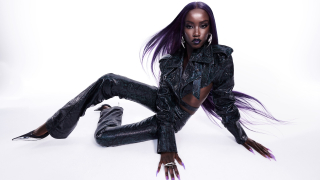Many critics and fans agree that Mad Men is one of the best shows on TV, but the series lacks one thing: diversity. That was true until last season when Teyonah Parris joined the all-white cast of AMC’s 1960s ad agency drama, playing Don Draper’s secretary, Dawn Chambers. Every Sunday this season, Parris has been unfolding Dawn’s personality layer by layer, as the stories center around historical moments like the murder of Martin Luther King Jr. and the Harlem riots.
EBONY.com spoke to the actress about the dynamics of working on the hit period drama, balancing the pressure, and just when Dawn might get that man she’s been searching for in between answering Don Draper’s phone calls.
EBONY: Is there any added pressure in playing the only black character on Mad Men?
Teyonah Parris: In any role you take, the responsibility and pressure is usually self-imposed. For Dawn, she is a person in the Mad Men community and I hold this role with the utmost importance, be it in an all-Black or ethnically mixed cast. I don’t treat Dawn any differently than any other role I’ve had, because if I did, I don’t think I’d be able to function. When you think of everything around a role and everything people are putting on you and want you to represent, there’s no way you can function and be truthful to a character with all of that in your head.
EBONY: What has been Dawn’s most pivotal moment on the show?
TP: Well, she has a last name, she’s Dawn Chambers, which means she has a backstory. Also, when she and Peggy sat down in Peggy’s apartment, Dawn told her about her life, her brother and her mom, and Peggy was open with her. In that scene I realized, “Oh wow, she’s going to be, and is, a living breathing character and has opinions in this world.” And that is amazing.
EBONY: How did you tackle the racially charged episode featuring the death of Martin Luther King Jr.? We shockingly found ourselves agreeing with the usually deplorable Pete during his argument with Harry, who didn’t understand why the ad business was grieving.
TP: That episode wasn’t so weird to me. When we read the script aloud and watched the show with the cast, what rang out was that everyone dealt with the loss differently. The two people who most wanted things to go back to normal and didn’t want the distraction of the death, regardless of how it was affecting them, were Harry and Dawn. In their different ways, they just wanted a sense of normality.
EBONY: When Dawn mentioned how her commute crowd gets whiter and whiter as she heads toward Madison Avenue, it struck us a funny that the same thing happens in 2013. Did you get any feedback from fans after that episode aired, and are there other moments Dawn’s experienced in the Mad Men 1960s that are actually still relevant today?
TP: A lot of times we find ourselves one of the few people of color. Be it at work or educational institutions—wherever it is—we do find that we’re alone, and that’s what was happening to Dawn. Afterward, I did get people on my Twitter and Facebook pages like, “Oh my God, this story happens repeatedly and it’s still relevant and true today!”
EBONY: In the more racially charged scenes, are you able to weigh in with the Mad Men writers and creator?
TP: As an actor, you bring your interpretation of a character that meets with the director and the writer’s interpretation. Somewhere in there, you find a happy medium. You try lots of different things on that day, but ultimately you have no control over what gets left on the cutting room floor. That’s an aspect of film I do like, any performance can be crafted completely differently than what you thought it’d be by taking different shots and putting it together. That’s the difference between film and theater.
EBONY: Since the show’s so secretive, how far in advance are you allowed to read the scripts and prepare?
TP: We usually get the script a day or two before shooting. We’re not even allowed to talk to family about it.
EBONY: We know you can’t tell too much of what’s coming up, but will we get to see more of Dawn’s backstory? Perhaps a shot of her in her friend’s wedding where she meets a beaux?
TP: I have no idea what’s in Dawn’s future. You’ll just have to watch and see!
Hillary Crosley is a journalist and the co-founder of Parlour magazine, an international website for women of color. Follow her on Twitter @HillaryCrosley.












